We didn't have time to talk. Thank God we are still alive after all.
| 20.11.2021 | Kornofolia/Kadıdondurma | josoor | 41.1559524, 26.2948505 | Greece | Turkey | no | yes | yes | yes | no | no | no | 2 - 55 | 59 | Afghanistan, Syria, Iraq, Morocco, unidentified African country | 19 | beating (with batons/hands/other), kicking, threatening with guns, reckless driving | 1x white and blue Scoda police car with “police” written on the side of it in English; 2x officers dressed in dark blue jackets with the Greek flag on their sleeves; 1x white Ford van; 1x officer wearing civilian clothes and a balaclava and 1x officer wearing a blue jacket and pants (Frontex?); 3- 5x officers wearing balaclavas, green pants and olive green jackets with Greek flags on the sleeves; 4x officers wearing green camouflage uniforms with Greek flags on the sleeves and carrying big guns; 2x officers wearing balaclavas and dark blue uniforms with Greek flags on the sleeves; 3x officers wearing balaclavas, green pants and black jackets with Greek flags on the sleeves; 3x officers in civilian clothing and balaclavas (speaking Arabic); 1x plastic grey boat |
The respondent, a 20-year-old Moroccan man, was pushed back with 58 other people from Kornofolia, Greece to Kadıdondurma, Turkey on November 20th, 2021.
At 6 pm on November 19th, the respondent took a bus from Edirne with his 55-year-old mother and 15-year-old sister to a spot near Kapıkule, Turkey. Along with four other Moroccan men, ranging in age from 15 to 32 years old, they got on a small plastic boat that they paddled across the Evros/Meriç River. They then walked for two or three hours until they arrived at a highway, where they weren’t sure how to cross but ended up deciding to walk under a small bridge. As they were crossing the road, a police car approached them with its siren on and chased them down. The other men managed to run away but the respondent stayed behind with his mother and sister.
The respondent said the police car was a white and blue Scoda with “police” written on the side of it in English. He recognized the car from the following picture.
[caption id="attachment_19100" align="alignnone" width="600"]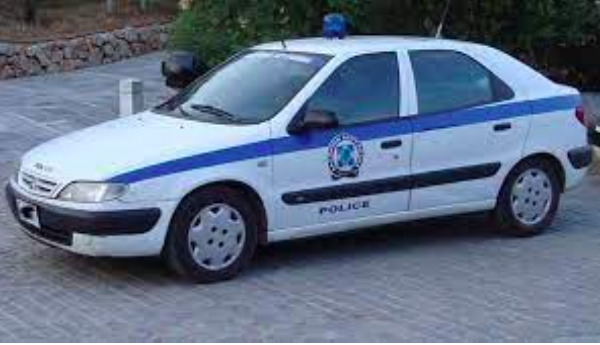 Scoda Octavia Greek Police Car[/caption]
Two officers were in the car, dressed in dark blue jackets with the Greek flag on their sleeves; one of them kept telling them to stop and was using a gun in his hand to threaten the group so they wouldn’t run away like the others explained the respondent. The respondent recognized their uniforms and the gun from the pictures below.
[caption id="attachment_19177" align="alignnone" width="600"]
Scoda Octavia Greek Police Car[/caption]
Two officers were in the car, dressed in dark blue jackets with the Greek flag on their sleeves; one of them kept telling them to stop and was using a gun in his hand to threaten the group so they wouldn’t run away like the others explained the respondent. The respondent recognized their uniforms and the gun from the pictures below.
[caption id="attachment_19177" align="alignnone" width="600"]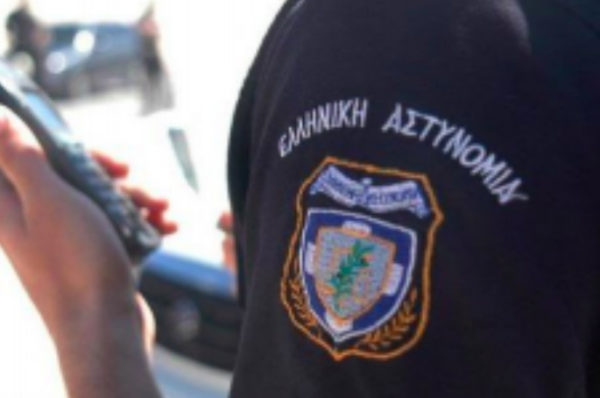 Logo on arm of uniform [/caption]
[caption id="attachment_19109" align="alignnone" width="600"]
Logo on arm of uniform [/caption]
[caption id="attachment_19109" align="alignnone" width="600"]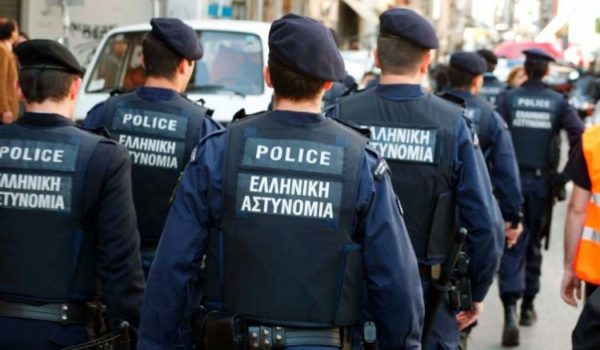 Back of uniform [/caption]
[caption id="attachment_19152" align="alignnone" width="300"]
Back of uniform [/caption]
[caption id="attachment_19152" align="alignnone" width="300"]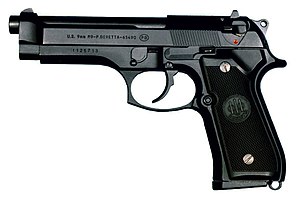 Beretta M9[/caption]
One of the officers told the family to give him their phones, which he put in a small plastic bag, and then told them to sit down and not be afraid, speaking to them in English. He also asked them where they were from, how they crossed, and how many people they were traveling with, which the respondent answered truthfully. After around 30 minutes, a white Ford van arrived, similar to the one in the following picture.
[caption id="attachment_19098" align="alignnone" width="600"]
Beretta M9[/caption]
One of the officers told the family to give him their phones, which he put in a small plastic bag, and then told them to sit down and not be afraid, speaking to them in English. He also asked them where they were from, how they crossed, and how many people they were traveling with, which the respondent answered truthfully. After around 30 minutes, a white Ford van arrived, similar to the one in the following picture.
[caption id="attachment_19098" align="alignnone" width="600"]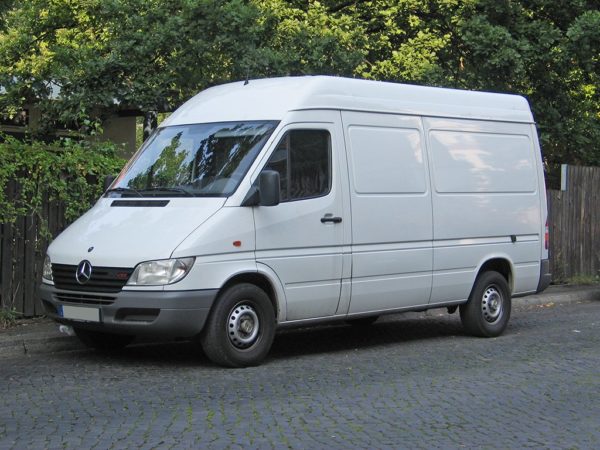 Image: White Van[/caption]
Two officers were in the van: a driver wearing civilian clothes and a balaclava and a passenger dressed in a uniform with a blue jacket and pants. The respondent said it looked like the uniform in the following picture, but without any flags, armbands, or other identifying symbols.
[caption id="attachment_19176" align="alignnone" width="601"]
Image: White Van[/caption]
Two officers were in the van: a driver wearing civilian clothes and a balaclava and a passenger dressed in a uniform with a blue jacket and pants. The respondent said it looked like the uniform in the following picture, but without any flags, armbands, or other identifying symbols.
[caption id="attachment_19176" align="alignnone" width="601"]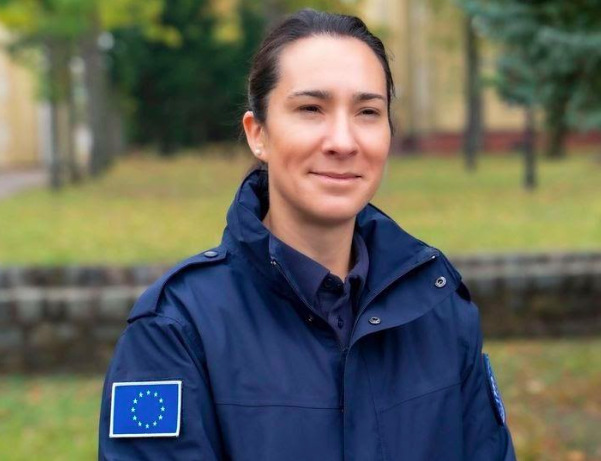 Uniform, as identified by the respondent, explained that the jacket was the same but the did not have any insignia that suggested it was Frontex[/caption]
The family was loaded into the back of the van, allowed to keep everything except their phones. After driving for around 15 minutes, the van stopped and picked up an Algerian and five Syrians, including a six-year-old boy and a woman. While the new people were loaded into the van, the respondent could see a forest and lights across the river in Turkey. They then continued driving for about 30 more minutes along an unpaved road; according to the respondent the driving was “too fast.”
When they stopped again, they found themselves at a detention site. They remained in the car, however, and the officer wearing civilian clothes and a balaclava came to the back and told them in Arabic to “make space and move to the back.” The respondent said of the officer’s accent: “It was proper Syrian. Even the Syrians that were with us said it was an Aleppo accent.”
With the doors to the van open, the respondent was able to see what was going on outside. He reported seeing three to five officers taking people out from a hallway in the building and loading them in the van. The officers were wearing balaclavas, green pants and olive green jackets with Greek flags on the sleeves. The respondent recognized the uniform as similar to the one in the picture below.
[caption id="attachment_19171" align="alignnone" width="596"]
Uniform, as identified by the respondent, explained that the jacket was the same but the did not have any insignia that suggested it was Frontex[/caption]
The family was loaded into the back of the van, allowed to keep everything except their phones. After driving for around 15 minutes, the van stopped and picked up an Algerian and five Syrians, including a six-year-old boy and a woman. While the new people were loaded into the van, the respondent could see a forest and lights across the river in Turkey. They then continued driving for about 30 more minutes along an unpaved road; according to the respondent the driving was “too fast.”
When they stopped again, they found themselves at a detention site. They remained in the car, however, and the officer wearing civilian clothes and a balaclava came to the back and told them in Arabic to “make space and move to the back.” The respondent said of the officer’s accent: “It was proper Syrian. Even the Syrians that were with us said it was an Aleppo accent.”
With the doors to the van open, the respondent was able to see what was going on outside. He reported seeing three to five officers taking people out from a hallway in the building and loading them in the van. The officers were wearing balaclavas, green pants and olive green jackets with Greek flags on the sleeves. The respondent recognized the uniform as similar to the one in the picture below.
[caption id="attachment_19171" align="alignnone" width="596"]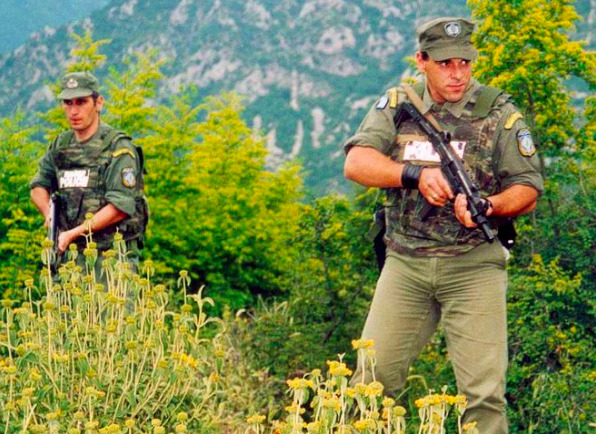 Green-uniformed border guards [/caption]
The respondent estimated that around 50 more people were loaded into the van with them, including Moroccans, Syrians, Afghans, Iraqis, and people that respondent said had “dark skin” that he guessed came from a country in Africa. The group also included a pregnant woman, around seven women, and at least ten minors, including a two-year-old and some adolescents traveling without their parents.
Then, the officers locked the van’s door and started driving. The respondent recalled:
“We couldn't [breathe properly] with the way the driver was driving. He didn't care that there were women and babies in the back or that there was a pregnant woman. He drove fast and recklessly. We tried to keep the balance of the pregnant woman by giving her space so we stuck more to each other.”
After approximately 25 minutes of fast driving down an unpaved road, the group arrived at the Evros/Meriç River. When they were let out of the van, they found they were in a small clearing in the forest with numerous officers wearing different uniforms. One of the officers, dressed in civilian clothes and a balaclava, told them in Arabic to “shut [their] mouths and not make noise.” according to the respondent.
Including the officers who drove the van, the respondent reported seeing 13 officers at the pushback site. Four of the officers were wearing green camouflage uniforms and carrying big guns, which the respondent recognized from the following pictures.
[caption id="attachment_19151" align="alignnone" width="600"]
Green-uniformed border guards [/caption]
The respondent estimated that around 50 more people were loaded into the van with them, including Moroccans, Syrians, Afghans, Iraqis, and people that respondent said had “dark skin” that he guessed came from a country in Africa. The group also included a pregnant woman, around seven women, and at least ten minors, including a two-year-old and some adolescents traveling without their parents.
Then, the officers locked the van’s door and started driving. The respondent recalled:
“We couldn't [breathe properly] with the way the driver was driving. He didn't care that there were women and babies in the back or that there was a pregnant woman. He drove fast and recklessly. We tried to keep the balance of the pregnant woman by giving her space so we stuck more to each other.”
After approximately 25 minutes of fast driving down an unpaved road, the group arrived at the Evros/Meriç River. When they were let out of the van, they found they were in a small clearing in the forest with numerous officers wearing different uniforms. One of the officers, dressed in civilian clothes and a balaclava, told them in Arabic to “shut [their] mouths and not make noise.” according to the respondent.
Including the officers who drove the van, the respondent reported seeing 13 officers at the pushback site. Four of the officers were wearing green camouflage uniforms and carrying big guns, which the respondent recognized from the following pictures.
[caption id="attachment_19151" align="alignnone" width="600"]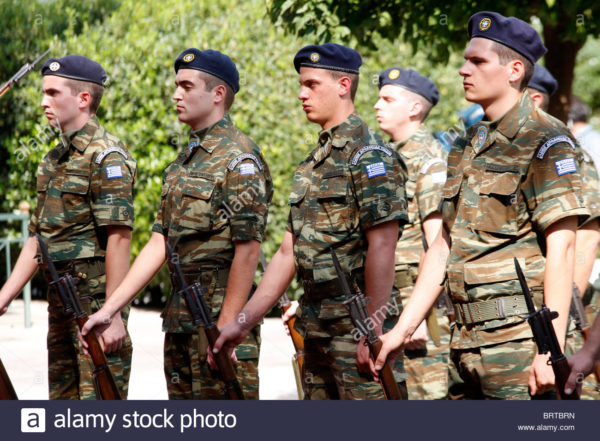 Hellenic Army Uniform[/caption]
[caption id="attachment_19164" align="alignnone" width="600"]
Hellenic Army Uniform[/caption]
[caption id="attachment_19164" align="alignnone" width="600"]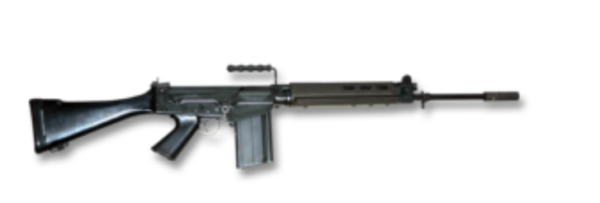 FN FAL - weapon identified by the respondent[/caption]
Two of the officers were wearing balaclavas and dark blue uniforms, which the respondent said looked like the ones in the picture below.
[caption id="attachment_19173" align="alignnone" width="400"]
FN FAL - weapon identified by the respondent[/caption]
Two of the officers were wearing balaclavas and dark blue uniforms, which the respondent said looked like the ones in the picture below.
[caption id="attachment_19173" align="alignnone" width="400"]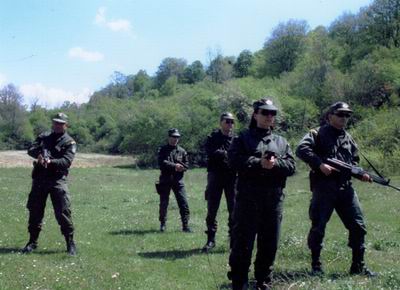 Greek border guard uniform[/caption]
Three of the officers were wearing balaclavas, green pants, and black jackets. They were also carrying branches. The respondent said their uniforms were similar to the one in the following picture.
[caption id="attachment_19138" align="alignnone" width="354"]
Greek border guard uniform[/caption]
Three of the officers were wearing balaclavas, green pants, and black jackets. They were also carrying branches. The respondent said their uniforms were similar to the one in the following picture.
[caption id="attachment_19138" align="alignnone" width="354"]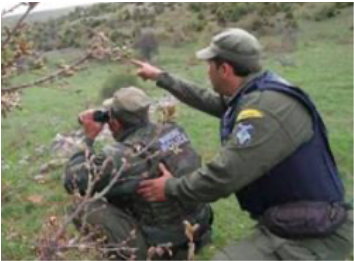 Backs of jackets of Greek Border Guard[/caption]
The last four officers were wearing civilian clothes and balaclavas. The respondent reported seeing Greek flags on all of the uniforms but the four wearing civilian clothing had nothing to show that they were officers. He also said he heard them speaking Greek to each other but Arabic and sometimes Turkish to the group.
The respondent recounted:
“They were holding guns and branches. They kept saying ‘show your money or we will beat you.’ They put us in line and searched us one by one. Once [the officer] came to my sister, who was in front of me, he started touching her in sensitive places. She was 15 years old and I said ‘stop!’ and they started beating me with a branch and kicking me.”
The beating lasted about three minutes and then the respondent and his family were told to take off their jackets and shoes, which, along with the money taken from them, were never given back.
Then the group was loaded into a grey plastic boat, measuring about three by two meters, eight people at a time. They were driven to the other side by two officers in civilian clothes who spoke Arabic. The respondent said the boat wasn’t very steady and recalled seeing water come in. He said they were driven to a spot about two meters from the Turkish side and told in Arabic to jump out of the boat, in waist-high water.
Once on Turkish soil, they walked for around three hours until they reached a village named Kadıdondurma from where they took a taxi to Edirne.
When asked if he or his family members asked for asylum, the respondent responded, “We didn't have time to talk. Thank God we are still alive after all.”
Backs of jackets of Greek Border Guard[/caption]
The last four officers were wearing civilian clothes and balaclavas. The respondent reported seeing Greek flags on all of the uniforms but the four wearing civilian clothing had nothing to show that they were officers. He also said he heard them speaking Greek to each other but Arabic and sometimes Turkish to the group.
The respondent recounted:
“They were holding guns and branches. They kept saying ‘show your money or we will beat you.’ They put us in line and searched us one by one. Once [the officer] came to my sister, who was in front of me, he started touching her in sensitive places. She was 15 years old and I said ‘stop!’ and they started beating me with a branch and kicking me.”
The beating lasted about three minutes and then the respondent and his family were told to take off their jackets and shoes, which, along with the money taken from them, were never given back.
Then the group was loaded into a grey plastic boat, measuring about three by two meters, eight people at a time. They were driven to the other side by two officers in civilian clothes who spoke Arabic. The respondent said the boat wasn’t very steady and recalled seeing water come in. He said they were driven to a spot about two meters from the Turkish side and told in Arabic to jump out of the boat, in waist-high water.
Once on Turkish soil, they walked for around three hours until they reached a village named Kadıdondurma from where they took a taxi to Edirne.
When asked if he or his family members asked for asylum, the respondent responded, “We didn't have time to talk. Thank God we are still alive after all.”
